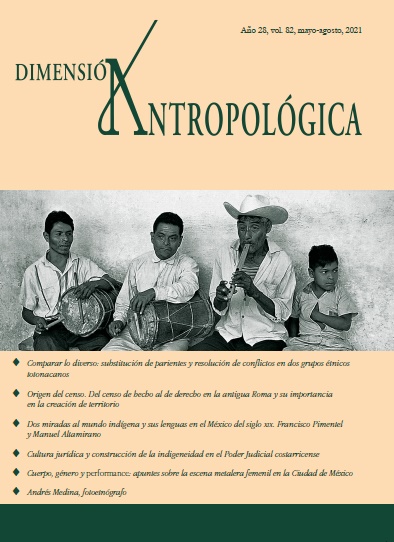Publicado 2021-08-31
Palabras clave
- cultura jurídica,
- indigeneidad,
- derechos,
- justicia,
- Poder Judicial
Cómo citar
Resumen
Este artículo tiene como objetivo realizar una exploración inicial de aspectos de índole cultural que inciden en el ejercicio de los derechos de los pueblos indígenas; para esto se indaga sobre la construcción de la indigeneidad en el marco de la cultura jurídica del Poder Judicial costarricense y sus consecuencias en la forma de impartir justicia y en el ejercicio de los derechos de pueblos y personas indígenas. A esos efectos se revisa una serie de sentencias de la Sala Constitucional costarricense y se entrevista a 12 personas juzgadoras judiciales, que como resultado de lo cual se advierte la aplicación de un derecho liberal y de una cultura jurídica positivista que incide en que la normatividad nacional se imponga en detrimento de la indígena.
Descargas
Referencias
- Abrams, Philip, “Notes on the Difficulty of Studying the State”, Journal of Historical Sociology, vol. 1, núm. 1, 1988, pp. 58-89.
- Anaya, James, La situación de los pueblos indígenas afectados por el proyecto hidroeléctrico El Diquís en Costa Rica, 30 de mayo de 2011.
- Cadena, Marisol de la, y Orin Starn, “Indigeneidad: problemáticas, experiencias y agendas en el nuevo milenio”, Tabula Rasa, núm. 10, enero-junio de 2009, pp. 191-223.
- Díaz Arias, David, “Entre la guerra de castas y la ladinización. La imagen del indígena en la Centroamérica liberal, 1870-1944”, Revista de Estudios Sociales, núm. 26, abril de 2007, pp. 58-72.
- Friedman, Lawrence, The Legal System: A Social Science Perspective, Nueva York, Russell Sage Foundation, 1975.
- ____________, “The Concept of the Legal Culture: A Reply”, en David Nelken (ed.), Comparing Legal Cultures, Aldershot, Reino Unido, Dartmouth, 1997, pp. 34-49.
- ____________, y R. Pérez Perdomo, Legal Culture in the Age of Globalization: Latin America and Latin Europe, Stanford, Stanford University Press, 2003.
- Gupta, Akhil, “Blurred Boundaries: The Discourse of Corruption, the Culture of Politics, and the Imagined State”, American Ethnologist, vol. 22, núm. 2, 1995, pp. 375-402.
- Hale, Charles, “El protagonismo indígena, las políticas estatales y el nuevo racismo en la época del ‘indio permitido’”, en Memoria del Congreso Internacional de minugua “Construyendo la paz: Guatemala desde un enfoque comparado”, Guatemala, 2004, pp. 51-66. Recuperado de: <http://www.cedet.edu.ar/Archivos/Bibliotecas_Archivos/id40/hale%20protagonismo%20indigena.pdf>.
- Instituto Nacional de Estadística y Censos Costa Rica, X Censo Nacional y VI de Vivienda. Resultados generales, San José, INEC, 2011.
- Quijano, Aníbal, “Raza, etnia y nación en Mariátegui: cuestiones abiertas”, Estudios Latinoamericanos, vol. 2, núm. 3, 1995, pp. 3-19.
- Schavelzon, Salvador, “Antropología del Estado en Bolivia: verdades sagradas, farsas políticas y definiciones de identidad”, Cuadernos de Antropología Social, núm. 28, 2008, pp. 67-84.
- Sharma, Aradhana, y Akhil Gupta (eds.), The Anthropology of the State. A Reader, Estados Unidos / Reino Unido / Australia, Blackwell Publishing, 2006.
- Thompson, John, Ideología y cultura moderna. Teoría crítica social en la era de las comunicaciones, México, UAM, 1998.

